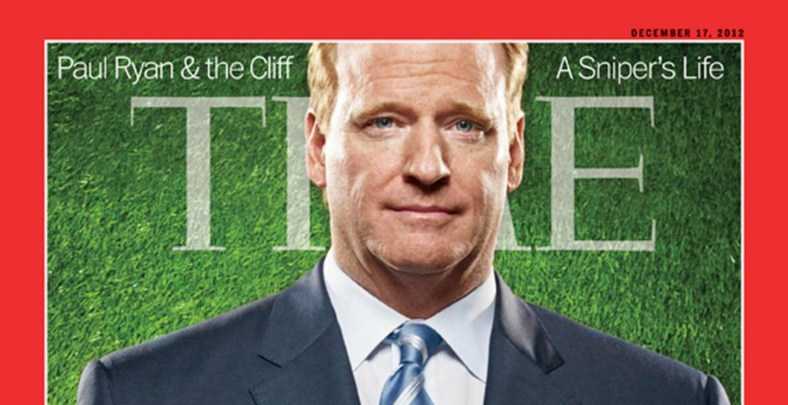
Annually TIME Magazine dubs one outstanding individual as it’s person of the year, a tradition as synonymous with the end-of-year festivities as the Macy’s parade on Thanksgiving or the ball dropping in New York City. Winners of this prestigious and/or infamous recognition at the heart of global culture have ranged from Adolph Hitler in 1938 to G.I. Joe in 1950, from Charles Lindbergh in 1927 to George W. Bush in 2000. This award is bestowed by the editors of TIME to the “person or persons who most affected or news and or lives, for good or ill, and embodied what was important about the year.”
Each fall eight nominees are named as the finalists for this prestigious and infamous honor, and 2014 is no exception to this annual event. The honorees this year include the groups of Ferguson protesters and Ebola caregivers that have headlined the news for months in starkly separate ways, in addition to a number of individuals.
Vladimir Putin, who received a TIME cover in 2007 for returning Russia to the world stage of power despite drastic consequences for his own people, was named as a nominee again this year alongside a fellow political-dynamo Masoud Barzani. Barzani has ruled the Kurdish Iraqi people since 2005, and continues to lead the fight against radical Islamic militants in Iraq and Syria. Further nominees include business elites Jack Ma and Tim Cook, of Ali Baba and Apple fame respectively, and finally the pop culture nominees. Taylor Swift, for removing her music from the popular-streaming service Spotify as a form of protest for artist rights, and Roger Goodell.
Yes the NFL’s much-maligned commissioner is a finalist for TIME’s person of the year. According to Forbes the NFL will reach an annual revenue level of nearly $9 Billion, making the NFL the world’s most lucrative professional league. This elite level of financial ecstasy is not enough for the Commish, however, as Goodell has pledged his goal of reaching an annual income level of $25 Billion by the year 2027. As surprising as the No Fun League’s commissioner’s nomination may have been, Goodell deserves his current stature as much as any of his fellow nominees.
The NFL’s miser will reach his financial goal by renegotiating TV rights and the rights for online streaming, modifying the league’s labor agreement that expires in 2020, and creating new revenue via the ever-expanding NFL Draft community; moving the site of the annual event out of its longtime-home in New York City.
Streaming is especially important as the league continues to push its “International Series” on fan-bases that have no interest in surrendering a home game to play in London. The NFL has held at least one game in London each year since 2007, and three contests are scheduled for the 2015 season. As the league expands, so does Goodell’s influence on the board of 32 owners, the only thing standing between the Commissioner and a total dictatorship at the head of one of the most influential mediums on the globe.
Yet it has not been, as Forrest Gump would say, all peas and carrots for the league during Goodell’s tenure. Over the past few years a debate has raged over the NFL’s concussion protocols and what the league owes to former players for brain damage. This issue was brought into the eyes of the mainstream media by the suicide of beloved-former Chargers linebacker Junior Seau, whose family has since filed a wrongful death lawsuit against the NFL.
Another pubic-relations catastrophe has seen major play this year surrounding the NFL’s battles with domestic abuse. In 2014 alone, Greg Hardy, Ray McDonald, Adrian Peterson, Jonathan Dwyer, and most notably Ray Rice, have been in the center of instances of domestic violence, drawing public ire against the league for lack of proper procedure in these situations.
Goodell himself lies at the heart of these character issues in the NFL, as he is the supreme ruler of a $9 billion entity, and because his actions towards the solution of these issues have fallen well-short of the commissioner’s efforts towards increasing the league’s revenue. Compare the Rice and Hardy scenarios: Rice was initially suspended two games until the video of his assault went viral. Goodell threw out the common legal doctrine of “double jeopardy” and suspended Rice for a year; handing out a harsher punishment despite no new evidence, for the same crime. Hardy, who was rumored to have choke-slammed a female partner onto a bed of assault rifles, has remained on the commissioner’s exempt list, which pays $770,000 a week, and will stay on the list until his trial is settled, which is likely to occur early in 2015.
Rice is and was a household-name long before his erroneous decision in Atlantic City and thus received significantly different treatment than Hardy, who was a no-name to all but the most hardcore fans. The priority showed by the league in dealing with these cases is synonymous with Goodell’s nomination for person of the year. Money drove the Rice situation, just as financial shrewdness has pushed Goodell into his spot as a finalist for TIME’s award. The only one thing that transcends sport, business, morality, and even culture, is money.
Goodell truly exemplifies the dualism that accompanies TIME’s prestigious annual expose. A boon for the owner’s checkbooks he represents while simultaneously an icon of the corrupt nature of the NFL in the eyes of fans, Goodell was certainly the most influential person in sports this year, if not the world. Few deserve more positive recognition than the Ebola workers or President Barzani, but TIME hit the nail on the head in defining their award by naming Goodell as a finalist.
Photo: TIME.com